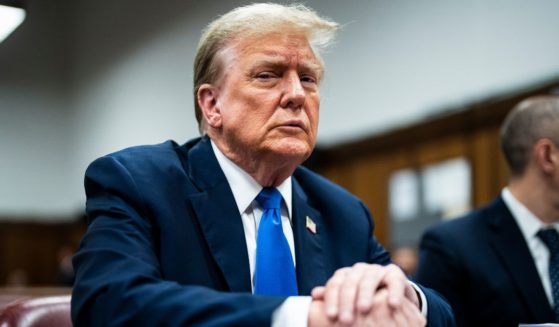Report: Big Tech Made Shocking Move Before DNC That Almost No One Noticed
Conservatives are supposed to believe that Facebook is the good guy. That’s because, of all the Big Tech companies out there, Facebook is the one that’s supposed to uphold “free speech” by still allowing campaign advertising.
The problem with this, according to the Democrats, is that the Trump campaign uses Facebook to spread untruths. That’s why they’re a lot happier with Twitter’s decision to ban campaign advertising during the 2020 cycle.
The issue with this explanation is that the reason for Twitter’s move likely had less to do with the Trump campaign’s alleged untruths, and more to do with the fact that Trump’s 2016 win was in large part because his campaign understood how to use social media better than the other candidates’ campaigns.
Thus, banning the Trump campaign from advertising on social media giants was less a matter of stopping bad actors from airing inaccurate campaign ads and more a willingness to shift the election’s fortunes toward Joe Biden.
The fact that Facebook was unwilling to do this angered the Biden campaign. In a public letter to Facebook on June 11, the Biden campaign said Facebook “continues to allow Donald Trump to say anything — and to pay to ensure that his wild claims reach millions of voters.”
“Trump and his allies have used Facebook to spread fear and misleading information about voting,” the campaign said.
“There is an election coming in November and we will protect political speech, even when we strongly disagree with it,” Facebook responded later that day.
Don’t buy that.
As the Media Research Center reported Tuesday: “In the months leading up to the Democratic National Convention, more than 260 conservative users on Facebook and Twitter had their posts about Biden scrubbed from the social media platforms. Posting an innocent meme showing light coming from Biden’s eyes meant an immediate suspension on Twitter for anywhere between 12 hours and two months.
“Facebook users who argued that Biden was ‘creepy’ or posted actual pictures of the former vice president hugging, sniffing, or kissing children have had their posts removed as well.”
So what about that election in November? And that protection of political speech?
Now, granted, this began in earnest in March 2020, after Facebook reduced the reach of a clip which the social media giant called “partly false” because it was edited in such a way as to seemingly show a stammering Biden endorse Trump.
“Because we cannot get re-elect, we cannot win this re-election. Excuse me, we can only re-elect Donald Trump,” Biden said in the clip.
Sleepy Joe?in St. Louis, Missouri today:
“We can only re-elect @realDonaldTrump.”#KAG2020LandslideVictory?? pic.twitter.com/FT4q2MWfcD
— Dan Scavino (@DanScavino) March 8, 2020
The point was, of course, that Biden has a tendency to stumble over his words, but everyone took this as manipulated media.
This clip is misleading. Biden stumbled on his words, but the clip ends mid-sentence. He said, “We can only re-elect Donald Trump if, in fact, we get engaged in this circular firing squad here.” https://t.co/THxMDnRzMm https://t.co/OJrHLg6a3X
— Thomas Kaplan (@thomaskaplan) March 8, 2020
“Facebook’s malfeasance when it comes to trafficking in blatantly false information is a national crisis in this respect,” then-Biden campaign manager Greg Schultz said, according to CNBC.
“Facebook won’t say it, but it is apparent to all who have examined their conduct and policies: they care first and foremost about money and, to that end, are willing to serve as one of the world’s most effective mediums for the spread of vile lies.”
Facebook would eventually flag the video as “partly false” and censor it.
However, this was hardly the only thing Big Tech was censoring during the several-month-long run-up to the convention.
“Other users received far more severe punishment from the platform for their posts. A collage of photos that depict Biden sniffing, hugging, or kissing young girls has been censored on a regular basis. Ironically, Facebook claims that this content ‘goes against Community Standards on nudity or sexual activity,’” the MRC reported.
“Even Facebook recognized the Joe Biden pictures as sexually explicit activity…I know because they suspended me multiple times over it,” one user who had posted this collage tweeted.
“Another user who posted the same collage wrote that they had been suspended from Facebook for 30 days for the post,” according to the MRC.
“What the tech companies are doing clearly violates both the social norm of free speech and the legal obligations they were supposed to abide by when Congress classified them as platforms rather than publishers,” Jonathan Anomaly, associate director of philosophy, politics and economics at the University of Pennsylvania, told the outlet, making clear reference to Section 230 of the Communications Decency Act.
As the MRC pointed out, that’s the carve-out “which gave immunity to online platforms from lawsuits, provided that they stay neutral. But according to Anomaly, ‘the Tech companies are illicitly taking sides.'”
“Of course that’s election interference,” said social media researcher, psychologist and former Psychology Today editor Dr. Robert Epstein. He added this “could be considered a valuable, undeclared, in-kind contribution to a political campaign, which is unlawful.”
Overall, there were 260 incidents reported and verified on the two major social media companies by the MRC: Facebook (129) and Twitter (131).
Suspensions on Twitter were similar — although some users were punished for bringing up concerns over Biden’s mental state.
“Much like Facebook, Twitter also removed statements about the alleged sexual harassment scandals that Biden may have been involved in. One user was suspended for a week for calling the former Vice President ‘Groping Joe.’ Another was removed for tweeting a GIF of Biden kissing a young girl, with the caption ‘Kisses from Biden,'” the MRC reported.
“Tweets that discussed Biden’s mental state were also punished. One user was suspended for a tweet that asked if the former vice president had Alzheimer’s Disease. Still another user posted lyrics from The Wizard of Oz with the hashtags #NeverBiden and #BidensCognitiveDecline.”
“Throughout our nation’s history, we have always elevated and protected the right of an individual’s voice to be heard, whether it’s in the legal system or in an open forum,” GOP Committeewoman Harmeet Dhillon told the Media Research Center.
“Social media companies once acted as a means to elevate the voices of the individual — particularly those without the power, wealth, or social reach to be easily heard otherwise — but now these very entities, having grown to vast international behemoths with the assistance of government protectionism, seek to suppress those voices, particularly when it comes to elections and matters of public policy.”
Yes, these are private companies — but they also want to be treated by the federal government as if they’re platforms and not publishers.
Their actions give the lie to that.
“Big Tech’s out to get conservatives,” Republican Rep. Jim Jordan of Ohio told the MRC.
‘That’s not a suspicion, that’s not a hunch, that’s a fact. It’s time they face the consequences for their actions. Period.”
That’s a fact, too.
Truth and Accuracy
We are committed to truth and accuracy in all of our journalism. Read our editorial standards.












